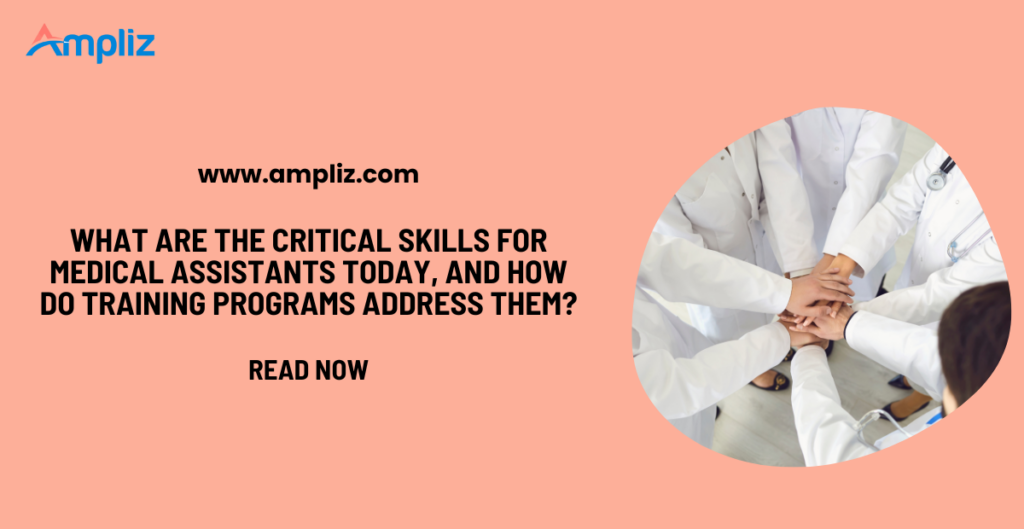Medical assistants bridge the gap between clinical care and administrative efficiency in healthcare. Their roles expand as technology evolves, patient needs grow, and staffing challenges increase across medical facilities.
Success in this field requires a blend of technical knowledge, adaptability, and strong communication skills. Modern training programs have stepped up to ensure these professionals are equipped to meet demands in fast-paced environments.
This article explores the essential skills medical assistants need today and how education prepares them for success.
Essential Skills Medical Assistants Need Today
Clinical Procedure Expertise
Medical assistants often handle tasks like drawing blood, preparing patients for exams, and administering medications. Mastery of these procedures ensures patient safety and supports the efficiency of healthcare providers.
Many clinics rely on medical assistants to collect accurate diagnostic information, such as vital signs or lab samples. This requires precision and an understanding of protocols to avoid errors that could impact patient outcomes.
As medical technology advances, assistants must also learn how to operate equipment like EKG machines or autoclaves. Staying updated with certifications helps professionals maintain confidence in handling evolving clinical responsibilities effectively.
Electronic Health Record (EHR) Proficiency
Another vital skill medical assistants need is handling electronic health record systems efficiently. Clinics and hospitals rely heavily on EHRs to document patient histories, manage prescriptions, and schedule appointments without delays.
Familiarity with different EHR platforms helps medical assistants adapt quickly to diverse workplaces. Many facilities prefer candidates who can troubleshoot minor issues or streamline workflows using these systems.
Attention to detail is critical when entering patient data or updating medical records. Small mistakes in EHRs can lead to billing issues, insurance claim rejections, or compromised patient safety.
Effective Communication Skills
Medical assistants often act as the bridge between patients and healthcare providers, making communication skills essential. They must clearly explain medical instructions, appointment details, or follow-up care without overwhelming patients with jargon.
Active listening is key to understanding patient concerns and relaying accurate information to physicians. Miscommunication can lead to delays or errors in treatment plans, making clarity essential at every step.
Interpersonal skills also help navigate sensitive conversations. Whether calming an anxious patient or managing scheduling conflicts with colleagues, strong communication fosters trust and keeps daily operations running smoothly.
Time Management and Multitasking
Healthcare settings are ever-busy, with medical assistants juggling clinical tasks, administrative duties, and patient interactions. Knowing how to prioritize ensures that urgent responsibilities like triaging patients or updating charts get immediate attention.
Interruptions are constant in a medical environment. So, assistants must understand how to balance walk-in patients, phone calls, and provider requests without losing focus.
Flexibility is equally needed in healthcare facilities. Schedules can change quickly, requiring medical assistants to adjust on the fly while maintaining accuracy and professionalism.
Patient Care and Empathy Techniques
Patients rely on medical assistants for reassurance during stressful situations. Offering a calm presence and showing genuine concern helps build trust and ease anxiety, especially in clinical environments.
Medical assistants should demonstrate empathy through active listening and thoughtful responses. Acknowledging patient concerns without rushing conversations fosters a sense of being heard and valued, which can improve overall satisfaction.
Beyond emotional support, medical assistants must ensure patients feel physically comfortable during procedures or exams. Small gestures, like explaining each step or checking for discomfort, create a more positive experience.
Adaptability to Technological Advancements
Medical assistants must embrace adaptability as healthcare technology evolves rapidly. It’s like being a skilled dancer; one needs to adjust to changing rhythms while maintaining grace and composure.
They face new software, tools, and procedures that require ongoing learning. Training programs emphasize the importance of being open to change, ensuring assistants stay proficient with innovations such as telehealth platforms or automated scheduling systems.
Hands-on training in various technologies prepares them for diverse environments. This skill not only enhances their capabilities but also improves patient experiences through efficient care delivery in an ever-changing landscape.
Knowledge of Medical Billing and Coding Basics
Lastly, understanding the fundamentals of medical billing and coding is crucial for today’s medical assistants. Accurate use of coding systems like CPT and ICD ensures proper reimbursement for services provided.
Mistakes in claims processing can delay payments or result in insurance denials. Medical assistants must verify patient information, match codes with treatments, and double-check documentation to avoid errors.
A working knowledge of compliance standards like HIPAA protects sensitive data while streamlining administrative workflows. Balancing these tasks alongside clinical responsibilities highlights the importance of being detail-oriented in both roles.
How Structured Education Programs In New Jersey And Pennsylvania Meet Modern Medical Assistant Training Needs
Incorporating EHR Software Training into Curricula
Programs in New Jersey and Pennsylvania are integrating hands-on EHR software training to prepare students for modern healthcare environments. Exposure to widely used platforms builds familiarity, reducing onboarding time after graduation.
Simulated patient scenarios allow learners to practice tasks like updating records, scheduling appointments, and ensuring compliance with data security regulations. This practical approach improves confidence when transitioning into real-world roles.
Mastery of EHR systems enhances career opportunities for medical assistants by making them versatile across diverse healthcare settings. Employers value candidates who can efficiently manage electronic workflows while maintaining accuracy under pressure.
Offering Specialized Modules in Patient-Centered Communication
To prepare medical assistants for dynamic healthcare roles, healthcare training features modules focused on patient-centered communication. These lessons emphasize building rapport, active listening, and conveying complex information in simple terms.
Students engage in role-playing exercises to handle scenarios like explaining procedures or addressing patient concerns empathetically. Such practice enhances their ability to manage sensitive conversations effectively.
Programs also teach cultural competency, ensuring medical assistants can communicate respectfully with diverse populations. This approach helps foster trust and positive relationships between patients and providers.
Partnering with Healthcare Facilities for Hands-On Externships
Hands-on externships connect classroom learning with real-world experience. Partnering with healthcare facilities allows students to practice clinical and administrative skills under professional supervision.
During externships, students work directly with patients and medical staff, gaining insight into daily operations. Tasks such as recording vitals, updating EHRs, or managing front-desk duties help them refine their competencies in live settings.
These experiences also build confidence and prepare students to handle the fast-paced nature of medical environments.
Expanding Focus on Medical Billing, Coding, and Compliance
Students in medical assistant programs now receive deeper training in billing, coding, and compliance to meet the demands of modern healthcare. Understanding CPT and ICD codes prepares them to process claims accurately for timely reimbursements.
Courses also cover insurance guidelines and legal requirements like HIPAA, helping students navigate the complexities of healthcare regulations. Such knowledge minimizes errors that can lead to denied claims or privacy violations.
Focusing on these areas equips graduates with administrative expertise that complements their clinical skills. This combination makes them indispensable in ensuring both patient care and operational efficiency within medical practices.
Wrapping Up
Medical assistants shape the heart of patient care and healthcare efficiency, blending skill with compassion. As roles expand, those equipped with modern training stand out in a competitive field.
Programs adapting to meet industry demands not only enhance professional readiness but also inspire confidence in their graduates. The future of healthcare relies on well-prepared individuals ready to handle challenges with precision, empathy, and expertise.



